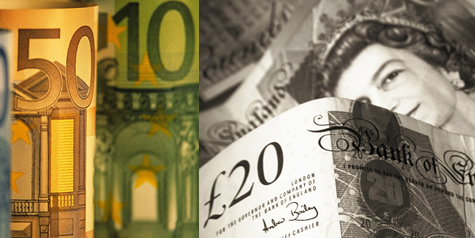Euro to Recover Against the Pound Sterling in 2016: Danske Bank Projections

The euro to pound sterling exchange rate may be falling now, but the bottom to the declines is fast coming into view argue researchers at Danske Bank.
The euro has slumped against sterling on news the US Fed could raise interest rates in December - this is significant as the Fed has effectively opened the doors to rate hikes in the UK.
The UK central bank is not brave enough to take the first step into a world of rising interest rates - a mere 0.25% to start with - and would rather follow the lead of its bigger cousin on the matter.
It is widely held that the GBP will trend higher ahead and after the first UK interest rate rise; but the size of the gain is where the debate is to be had.
Analysts at Danske Bank have told clients that they are watching for a bottom of 0.71 to be reached in EURGBP in 6 months - a level that is notably higher than many other FX forecasters are expecting and sets out the view that maybe the euro-sterling is not the one-way bet many hold it to be.
The decline will be welcomed by those looking for a stronger pound as the EUR/GBP has been trending higher since mid-July primarily driven by a more dovish stance from the Bank of England (BoE).
Nothing matters more to the GBP than the timing of the elusive first rate hike. Expectations for that hike were further delayed this month after official data showed the UK fell back into deflation in September. CPI inflation declined to -0.1% y/y, from 0.0% y/y in August.
Higher Inflation = a Rate Rise = Stronger Pound
Unless we see a further drop in commodity prices, Danske's economists think inflation hit the bottom in September.
"As inflation bottoms out and a BoE rate hike moves closer, we expect EUR/GBP to trade gradually lower over the medium term," says Morten Helt, Senior Analyst at Danske Bank.
Analysts believe CPI inflation will pick up close to 1% in January 2016 when the base effects from the drop in oil prices in H2 14 begin to drop out.
This trajectory in prices will most likely prompt that evasive rate hike at the Bank of England to be brought forward.
However, those hoping for a deep drop in the EURGBP conversion could be disappointed; the euro is forecast to ultimately begin strengthening again soon after the hike.
"We still expect EUR/GBP to bottom out around the time of the first BoE hike as fiscal consolidation and political risks in the UK (EU referendum) are expected to weigh on GBP while the euro, to a greater extent, should benefit from fundamentals next year," says Helt.
Danske have rolled their 6M and 12M forecasts slightly upwards to 0.71 (0.70) and 073 (0.72), respectively, but emphasise that the cross could temporarily undershoot our forecast around the time of the first BoE hike.
Interestingly, Danske Bank stand back from the widely held view that the Bank of England will only raise interest rates once the Fed has done so.
"Given the recent softness in US data and not least if US wage growth remains absent, we emphasise that a BoE rate hike does not depend on the Fed hiking rates," says Helt.
We read this as being a positive for the pound to dollar exchange rate - a pair that has been held within tight ranges owing to the view that the Bank of England will only move once the Fed has moved.
Ultimately, the BoE should react to domestic economic factors when determining British monetary policy.
If markets believe this is the view the Bank is willing to take then we would certainly expect some good upside in the British pound towards the upper limits set out in the Danske Bank forecasts.
Note, this projection for the GBP to EUR conversion echoes closely that held by analysts at Lloyds Bank.









 Back
Back


